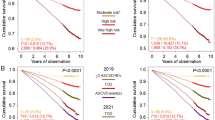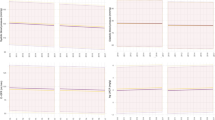Abstract
Background
Cardiovascular disease is the leading cause of morbidity and mortality among patients with diabetes, and for this reason, all guidelines for CV risk management provide the same targets in controlling traditional CV risk factors in patients with type 1 or type 2 diabetes at equal CV risk class. Aim of our study was to evaluate and compare CV risk management in patients with type 1 and type 2 diabetes included in AMD Annals Database paying particular attention to indicators of clinical inertia.
Methods
This was a multicenter, observational, retrospective study of AMD Annals Database during year 2022. Patients with diabetes were stratified on the basis of their cardiovascular risk, according to ESC-EASD guidelines. The proportion of patients not treated with lipid-lowering despite LDL cholesterol > to 100 mg/dl or the proportion of patients not treated with antihypertensive drug despite BP > 140/90 mmhg and proportion of patients with proteinuria not treated with angiotensin converting enzyme inhibitors or angiotensinogen receptor blockers (ACE/ARBs) were considered indicators of clinical inertia. The proportion of patients reaching at the same time HbA1c < 7% LDL < 70 mg/dl and BP < 130/80 mmhg were considered to have good multifactorial control. Overall quality of health care was evaluated by the Q-score.
Results
Using the inclusion criteria and stratifying patients by ESC/EASD Cardiovascular Risk categories, we included in the analysis 118.442 patients at High Cardiovascular risk and 416.246 patients at Very High Cardiovascular risk. The proportion of patients with good multifactorial risk factor control was extremely low in both T1D and T2D patients in each risk class. At equal risk class, the patients with T1D had lower proportion of subjects reaching HbA1c, LDL, or Blood Pressure targets. Indicators of clinical inertia were significantly higher compared with patients with T2D at equal risk class. Data regarding patients with albuminuria not treated with RAAS inhibitors were available only for those at Very High risk and showed that the proportion of patients not treated was again significantly higher in patients with T1DM.
Conclusions
In conclusion, this study provides evidence of wide undertreatment of traditional cardiovascular risk factors among patients with diabetes included in AMD Annals Database. Undertreatment seems to be more pronounced in individuals with T1D compared to those with T2D and is frequently due to clinical inertia.
Similar content being viewed by others
Data availability
Data described in the manuscript, code book, and analytic code will be made available upon request pending application and approval of all authors.
References
Sun H, Saeedi P, Karuranga S, Pinkepank M, Ogurtsova K, Duncan BB, Stein C, Basit A, Chan JCN, Mbanya JC, Pavkov ME, Ramachandaran A, Wild SH, James S, Herman WH, Zhang P, Bommer C, Kuo S, Boyko EJ, Magliano DJ (2022) IDF diabetes atlas: global, regional and country-level diabetes prevalence estimates for 2021 and projections for 2045. Diabetes Res Clin Pract 183:109119. https://doi.org/10.1016/j.diabres.2021.109119
Miller RG, Mahajan HD, Costacou T, Sekikawa A, Anderson SJ, Orchard TJ (2016) A contemporary estimate of total mortality and cardiovascular disease risk in young adults with type 1 diabetes: the Pittsburgh epidemiology of diabetes complications study. Diabetes Care 39(12):2296–2303. https://doi.org/10.2337/dc16-1162
Rosengren A, Dikaiou P (2023) Cardiovascular outcomes in type 1 and type 2 diabetes. Diabetologia 66(3):425–437. https://doi.org/10.1007/s00125-022-05857-5
Einarson TR, Acs A, Ludwig C, Panton UH (2018) Prevalence of cardiovascular disease in type 2 diabetes: a systematic literature review of scientific evidence from across the world in 2007–2017. Cardiovasc Diabetol 17(1):83. https://doi.org/10.1186/s12933-018-0728-6
Colussi G, Da Porto A, Cavarape A (2020) Hypertension and type 2 diabetes: lights and shadows about causality. J Hum Hypertens 34(2):91–93
Rawshani A, Sattar N, Franzén S, Rawshani A, Hattersley AT, Svensson AM, Eliasson B, Gudbjörnsdottir S (2018) Excess mortality and cardiovascular disease in young adults with type 1 diabetes in relation to age at onset: a nationwide, register-based cohort study. Lancet 392(10146):477–486. https://doi.org/10.1016/S0140-6736(18)31506-X
Gubitosi-Klug R, Gao X, Pop-Busui R, de Boer IH, White N, Aiello LP, Miller R, Palmer J, Tamborlane W, Wallia A, Kosiborod M, Lachin JM, Bebu I, DCCT/EDIC Research Group (2021) Associations of microvascular complications with the risk of cardiovascular disease in type 1 diabetes. Diabetes Care 44(7):1499–1505. https://doi.org/10.2337/dc20-3104
Helve J, Sund R, Arffman M, Harjutsalo V, Groop PH, Grönhagen-Riska C, Finne P (2018) Incidence of end-stage renal disease in patients with type 1 diabetes. Diabetes Care 41(3):434–439. https://doi.org/10.2337/dc17-2364
Bebu I, Braffett BH, Pop-Busui R, Orchard TJ, Nathan DM, Lachin JM; DCCT/EDIC Research Group (2017) The relationship of blood glucose with cardiovascular disease is mediated over time by traditional risk factors in type 1 diabetes: the DCCT/EDIC study. Diabetologia 60(10):2084-2091. doi:https://doi.org/10.1007/s00125-017-4374-4
Rawshani A, Rawshani A, Sattar N, Franzén S, McGuire DK, Eliasson B, Svensson AM, Zethelius B, Miftaraj M, Rosengren A, Gudbjörnsdottir S (2019) Relative prognostic importance and optimal levels of risk factors for mortality and cardiovascular outcomes in type 1 diabetes mellitus. Circulation 139(16):1900–1912. https://doi.org/10.1161/CIRCULATIONAHA.118.037454
Rawshani A, Rawshani A, Franzén S, Eliasson B, Svensson AM, Miftaraj M, McGuire DK, Sattar N, Rosengren A, Gudbjörnsdottir S (2017) Mortality and cardiovascular disease in type 1 and type 2 diabetes. N Engl J Med 376(15):1407–1418. https://doi.org/10.1056/NEJMoa1608664
Harjutsalo V, Pongrac Barlovic D, Groop PH (2021) Long-term population-based trends in the incidence of cardiovascular disease in individuals with type 1 diabetes from Finland: a retrospective, nationwide, cohort study. Lancet Diabetes Endocrinol 9(9):575–585. https://doi.org/10.1016/S2213-8587(21)00172-8
Marx N, Federici M, Schütt K, Müller-Wieland D, Ajjan RA, Antunes MJ, Christodorescu RM, Crawford C, Di Angelantonio E, Eliasson B, Espinola-Klein C, Fauchier L, Halle M, Herrington WG, Kautzky-Willer A, Lambrinou E, Lesiak M, Lettino M, McGuire DK, Mullens W, Rocca B, Sattar N, ESC Scientific Document Group (2023) 2023 ESC guidelines for the management of cardiovascular disease in patients with diabetes: developed by the task force on the management of cardiovascular disease in patients with diabetes of the European Society of Cardiology (ESC). Eur Heart J 44(39):4043–4140. https://doi.org/10.1093/eurheartj/ehad192
ElSayed NA, Aleppo G, Aroda VR, Bannuru RR, Brown FM, Bruemmer D, Collins BS, Das SR, Hilliard ME, Isaacs D, Johnson EL, Kahan S, Khunti K, Kosiborod M, Leon J, Lyons SK, Perry ML, Prahalad P, Pratley RE, Seley JJ, Stanton RC, Gabbay RA; American Diabetes Association (2023) Erratum. 10. Cardiovascular disease and risk management: standards of care in diabetes-2023. Diabetes Care 46(suppl 1):S158-S190. Diabetes Care 46(4):898 (2023). doi:https://doi.org/10.2337/dc23-er04. Erratum for: Diabetes Care 46(suppl 1):S158-S190 (2023)
Pintaudi B, Scatena A, Piscitelli G, Frison V, Corrao S, Manicardi V, Graziano G, Rossi MC, Gallo M, Mannino D, Di Bartolo P, Nicolucci A (2021) Clinical profiles and quality of care of subjects with type 2 diabetes according to their cardiovascular risk: an observational, retrospective study. Cardiovasc Diabetol 20(1):59
Pintaudi B, Scatena A, Piscitelli G, Frison V, Corrao S, Manicardi V, Graziano G, Chiara Rossi M, Gallo M, Mannino D, Nicolucci A, Di Bartolo P (2021) Clinical profiles and quality of care of adults with type 1 diabetes according to their cardiovascular risk: a multicenter, observational, retrospective study. Diabetes Res Clin Pract 182:109131. https://doi.org/10.1016/j.diabres.2021.109131
Russo G, Di Bartolo P, Candido R, Lucisano G, Manicardi V, Giandalia A, Nicolucci A, Rocca A, Rossi MC, Di Cianni G; AMD Annals Study Group (2023) The AMD annals: a continuous initiative for the improvement of type 2 diabetes care. Diabetes Res Clin Pract 199:110672. doi:https://doi.org/10.1016/j.diabres.2023.110672
Rossi MC, Nicolucci A, Arcangeli A, Cimino A, De Bigontina G, Giorda C, Meloncelli I, Pellegrini F, Valentini U, Vespasiani G; Associazione Medici Diabetologi Annals Study Group (2008) Baseline quality-of-care data from a quality-improvement program implemented by a network of diabetes outpatient clinics. Diabetes Care 31(11):2166–8. doi:https://doi.org/10.2337/dc08-0469
De Berardis G, Pellegrini F, Franciosi M, Belfiglio M, Di Nardo B, Greenfield S, Kaplan SH, Rossi MC, Sacco M, Tognoni G, Valentini M, Nicolucci A; QuED (Quality of Care and Outcomes in Type 2 Diabetes) Study Group (2008) Quality of diabetes care predicts the development of cardiovascular events: results of the QuED study. Nutr Metab Cardiovasc Dis 18(1):57–65. doi:https://doi.org/10.1016/j.numecd.2006.04.009
Cosentino F, Grant PJ, Aboyans V, Bailey CJ, Ceriello A, Delgado V, Federici M, Filippatos G, Grobbee DE, Hansen TB, Huikuri HV, Johansson I, Jüni P, Lettino M, Marx N, Mellbin LG, Östgren CJ, Rocca B, Roffi M, Sattar N, Seferović PM, Sousa-Uva M, Valensi P, Wheeler DC; ESC Scientific Document Group (2020) 2019 ESC Guidelines on diabetes, pre-diabetes, and cardiovascular diseases developed in collaboration with the EASD. Eur Heart J 41(2):255-323. doi:https://doi.org/10.1093/eurheartj/ehz486. Erratum in: Eur Heart J 41(45):4317 (2020)
Varkevisser RDM, Birnie E, Vollenbrock CE, Mul D, van Dijk PR, van der Klauw MM, Veeze H, Wolffenbuttel BHR, Aanstoot HJ (2022) Cardiovascular risk management in people with type 1 diabetes: performance using three guidelines. BMJ Open Diabetes Res Care 10(4):e002765. https://doi.org/10.1136/bmjdrc-2022-002765
Shah VN, Grimsmann JM, Foster NC, Dost A, Miller KM, Pavel M, Weinstock RS, Karges W, Maahs DM, Holl RW (2020) Undertreatment of cardiovascular risk factors in the type 1 diabetes exchange clinic network (United States) and the prospective diabetes follow-up (Germany/Austria) registries. Diabetes Obes Metab 22(9):1577–1585. https://doi.org/10.1111/dom.14069
Orchard TJ, Forrest KY, Kuller LH, Becker DJ; Pittsburgh Epidemiology of Diabetes Complications Study (2001) Lipid and blood pressure treatment goals for type 1 diabetes: 10-year incidence data from the Pittsburgh epidemiology of diabetes complications study. Diabetes Care 24(6):1053–1059. doi:https://doi.org/10.2337/diacare.24.6.1053
Hero C, Rawshani A, Svensson AM, Franzén S, Eliasson B, Eeg-Olofsson K, Gudbjörnsdottir S (2016) Association between use of lipid-lowering therapy and cardiovascular diseases and death in individuals with type 1 diabetes. Diabetes Care 39(6):996–1003. https://doi.org/10.2337/dc15-2450
Ebekozien O, Mungmode A, Sanchez J et al (2023) Longitudinal trends in glycemic outcomes and technology use for over 48,000 people with type 1 diabetes (2016–2022) from the T1D exchange quality improvement collaborative. Diabetes Technol Ther 25(11):765–773
Katz ML, Guo Z, Laffel LM (2018) Management of hypertension and high low-density lipoprotein in pediatric type 1 diabetes. J Pediatr 197:140-146.e12. https://doi.org/10.1016/j.jpeds.2017.11.059
Katz ML, Guo Z, Cheema A, Laffel LM (2019) Management of cardiovascular disease risk in teens with type 1 diabetes: perspectives of teens with and without dyslipidemia and parents. Pediatr Diabetes 20(2):210–216. https://doi.org/10.1111/pedi.12771
Pastore I, Bolla AM, Montefusco L et al (2020) The impact of diabetes mellitus on cardiovascular risk onset in children and adolescents. Int J Mol Sci 21(14):4928
Chowdhury R, Khan H, Heydon E et al (2013) Adherence to cardiovascular therapy: a meta-analysis of prevalence and clinical consequences. Eur Heart J 34(38):2940–2948
Madar H, Lalanne-Mistrih ML, Lebbar M et al (2023) Cardiovascular risk factors and adherence to cardiovascular protection practice guidelines in adults with type 1 diabetes: a BETTER registry cross-sectional analysis. Can J Diabetes 47(6):473-481.e1
Rossi MC, Lucisano G, Comaschi M, Coscelli C, Cucinotta D, Di Blasi P, Bader G, Pellegrini F, Valentini U, Vespasiani G, Nicolucci A; AMD-QUASAR Study Group (2011) Quality of diabetes care predicts the development of cardiovascular events: results of the AMD-QUASAR study. Diabetes Care 34(2):347–352. doi:https://doi.org/10.2337/dc10-1709.
Author information
Authors and Affiliations
Corresponding author
Ethics declarations
Conflict of interest
All authors have no conflict of interest to declare related to the contents of this study.
Ethical approval
All participating diabetes centers obtained the authorization of the local Ethics Committee.
Informed consent
Informed consent was obtained from all subjects and centers involved in this study.
Additional information
Publisher's Note
Springer Nature remains neutral with regard to jurisdictional claims in published maps and institutional affiliations.
Rights and permissions
Springer Nature or its licensor (e.g. a society or other partner) holds exclusive rights to this article under a publishing agreement with the author(s) or other rightsholder(s); author self-archiving of the accepted manuscript version of this article is solely governed by the terms of such publishing agreement and applicable law.
About this article
Cite this article
Da Porto, A., Candido, R., Rocca, A. et al. Quality of care and clinical inertia in the management of cardiovascular risk factors in patients with type 1 and type 2 diabetes: data from AMD annals. J Endocrinol Invest (2024). https://doi.org/10.1007/s40618-024-02327-0
Received:
Accepted:
Published:
DOI: https://doi.org/10.1007/s40618-024-02327-0




